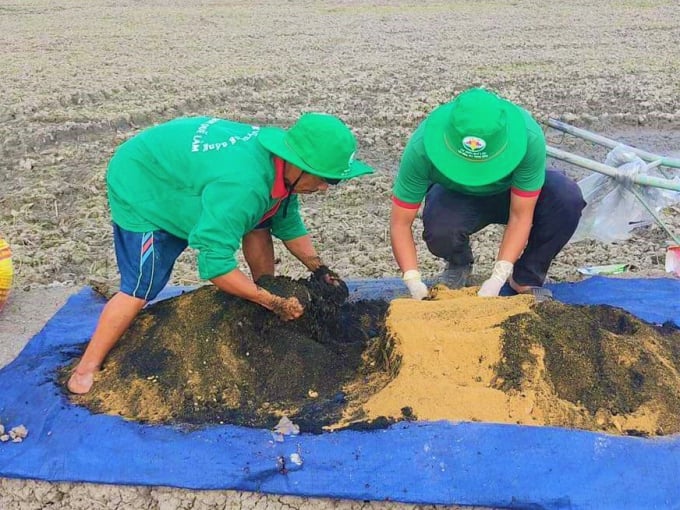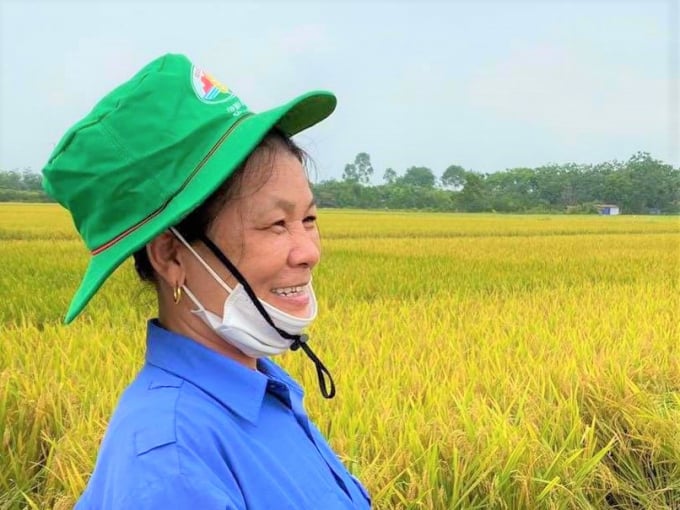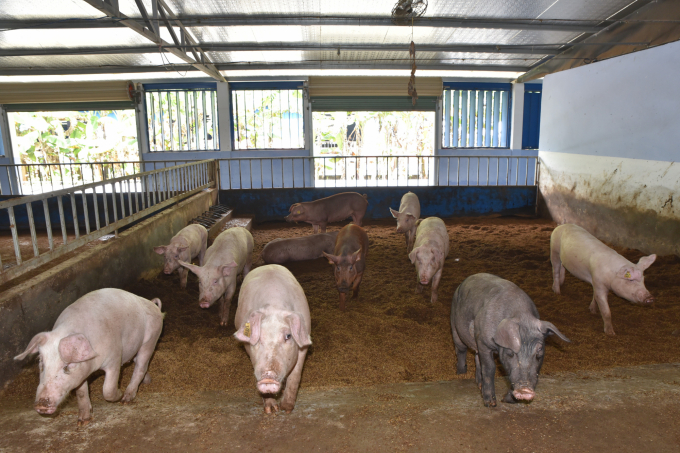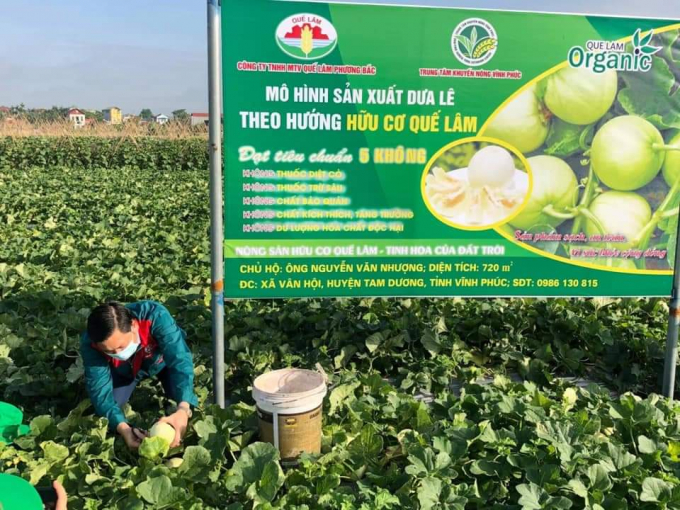May 21, 2025 | 13:46 GMT +7
May 21, 2025 | 13:46 GMT +7
Hotline: 0913.378.918
May 21, 2025 | 13:46 GMT +7
Hotline: 0913.378.918
In 2021, Vinh Phuc province distributed and assisted farmers in purchasing 56 tons of Lacto Powder T microbiological preparations for straw handling, over 84 tons of preparations, and 1,350 tons of cushion for the livestock farming environment. These are scientific and technological improvements that have been transferred and used in production, hence increasing agricultural productivity in Vinh Phuc.

There are increasing numbers of models using microbial products in cultivation, animal husbandry, and effective treatment of agricultural by-products. Photo: Hoang Anh.
Vinh Phuc employed Lacto Powder T preparations on 2,000 hectares of cultivated areas in many places, including Vinh Yen city, Phuc Yen City, Lap Thach district, Tam Duong district, Tam Dao district, Binh Xuyen district, Yen Lac district, Vinh Tuong district, and Song Lo district.
The efficacy was immediately apparent in the following crop. Lacto Powder T microbial preparation enables farmers to convert straw directly on the field into organic fertilizer. Lacto Powder T microbial product, which is mostly composed of hostile fungus strains and microorganisms, has raised soil porosity, increased hummus, cured fungal infections, and combated organic poisoning after transplantation, therefore promoting rice plant growth.
Ngu Kien Commune, Vinh Tuong District, is one of the places supported by the Vinh Phuc Agricultural Extension Center in conjunction with Que Lam Phuong Bac One Member Co., Ltd on 70 hectares of land occupied by 600 households.

Vinh Phuc farmers are excited by the effectiveness of using microbial products to treat rice straw, helping to have a bountiful harvest. Photo: Hoang Anh.
Farmers in Ngu Kien commune said that before, farmers used to produce constantly in a field according to intensive agricultural practices, and straws were often left unprocessed after harvest, resulting in sluggish degradation. It is the cause of yellow leaves, dark roots, and stunted development in the next crop's rice plants.
Because microbial is used to treat straw, only 10-15 days after soaking the straw does the Lacto Powder T preparation soften the soil, making it easy to sow while the rice plant develops well and is free of pests and weeds.
Utilizing Lacto Powder T, in particular, allows for a 30% reduction in fertilizer use while increasing rice yields by 50-80 kg per acre.
Lacto Powder T's usefulness is also shown in the livestock farming model, as it aids in the reduction of environmental contamination and increases the development of cattle and poultry.
Using Mr. Nguyen Van Chang's example of beef cattle breeding and fattening in a 1,500 meter-square-barn in Phu Cuong hamlet, Tu Yen commune, Song Lo district.
Mr. Chang said that his cattle farming strategy previously suffered serious pressure due to the problem of environmental pollution. Despite several solutions, the issue remained unsolved until he used microbial preparation as a cushion.
Mr. Chang's technique involves the use of cushion (mostly rice husks and sawdust), EM probiotics, and Lacto Powder T formulations to promote the growth of helpful microbes that produce yeast fibers that aid in the decomposition of waste in animals.
Microbiological products have decomposed garbage, completely eliminating smells and hazardous fumes in the barn. Whereas cattle manure was once a source of distress, it has now become a source of organic fertilizer, allowing his family to earn more money.
Similarly, Mr. Le Hong Sang's style of chicken and duck farming in Phuong Khoan commune, Song Lo district has increased its environmental efficiency by assisting hens and ducks in growing well, lowering input costs, and increasing organic fertilizer supplies for farming.

Prioritizing mechanisms and policies for the application of probiotics, Vinh Phuc has effectively solved the pressure of waste in livestock. Photo: Hoang Anh.
He daily combines microbiological materials with clean water for the hens and sprays the mixture on the wall, watering the biological mattress every 2-4 days. Probiotics containing healthy bacteria assist in stimulating the digestive system, promoting fast development, and inhibiting the growth of dangerous and pathogenic germs in poultry. Additionally, after each usage, the bio-buffer acts as a source of high-quality organic fertilizer for plant fertilization.
Mr. Nguyen Hoang Duong, director of the Vinh Phuc Agriculture Extension Center, said that the province has opted to encourage microbial preparation as a means of mitigating environmental pollution in cattle husbandry. The center assisted farmers in conducting the model on seven million poultry, one hundred thousand pigs, one thousand dairy cows, and one thousand beef cattle.
The program's findings indicate that employing probiotics to clean the livestock environment decreased barn odor, conserved water, and labor, assured disease safety, boosted economic efficiency from 9% to 13% when producing chickens and pigs, and increased it by 14.26 percent while raising beef. The first step, in particular, has effected positive change by increasing awareness among organizations and people about the critical nature of livestock waste treatment and environmental cleanliness for cattle.
More crucially, this transition has influenced agricultural philosophy, shifting it toward organic and circular agriculture.
Since 2012, the Vinh Phuc Agriculture Extension Center has collaborated with the Que Lam Group to implement a variety of organic and organic agricultural production methods across the province.

"Going organic" on livestock production has helped Vinh Phuc accelerate organic farming production models. Photo: Hoang Anh.
Each of these devices is based on microbiological technology and has amazing efficacy. In the spring harvest of 2021, the model of cultivating rice variety DT 39 Que Lam organically on a 5-hectare plot in Yen Thu village, Yen Phuong commune, Yen Lac district produced 64 quintals per ha and even 70 quintals per ha in certain locations.
How to use Lacto Powder T
Lacto Powder T is used in the production of pigs, poultry, and cows as a biological buffer. Agricultural materials (pig dung, chicken manure, buffalo and cow manure, straw, rice straw, and maize stalks) decompose rapidly into organic fertilizer, eliminating pathogens that are damaging to plants.
This is a product made by Que Lam Group in collaboration with Sky Life Corporation (Japan). It contains 20% lactic acid bacteria (Lactobacillus fermentum), 30% trehalose sugar, and 50% soybean meal.
The ideal approach to utilize it in pig production models is to combine animal feed with Lacto Powder T microbiological products at a rate of 2 kg of preparations per ton. Food should be stored in a cool, dry location for up to two months. Each day, combine mixed feed with probiotics and clean water in a ratio of 20 kg feed to 10 kg clean water, then place in a barrel and compost for 24-36 hours before using. After incubation, the product should be utilized within a day.
For rice growing models, probiotics combined with organic fertilizers are used to treat rice straw around 10 days after harvest. Microbial preparations containing antagonistic fungi have a significant effect on accelerating the decomposition of organic matter, improving soil quality, increasing humus, increasing the density of beneficial insects, and shortening the time required for straw decomposition, thereby serving as a source of fertilizer for the fields...
Translated by Linh Linh

(VAN) The trade turnover of agro-forestry-fishery products is growing significantly, along with investment cooperation commitments that are opening up new development directions between Vietnam and Russia.

(VAN) Khanh Hoa is investing over 545 billion VND to develop 240 hectares of high-tech marine aquaculture in order to guarantee a consistent supply of seafood exports and achieve the USD 1 billion target.

(VAN) Minister of Agriculture and Environment Do Duc Duy held a meeting with Soopakij Chearavanont, Chairman of C.P. Group, on May 15.
/2025/05/16/3800-0-nongnghiep-143756.jpg)
(VAN) Suntory PepsiCo Vietnam coordinated with the Ministry of Education and Training to implement an education program on water conservation, reaching nearly 1 million primary school students nationwide.

(VAN) Vietnam’s TH Group officially put its high-tech fresh milk processing plant into operation in the Russian Federation, marking a historic moment as the first TH true MILK cartons were produced in Russia.

(VAN) Use of high-quality broodstock and biotechnology is regarded as the most effective approach to ensuring sustainable and economically viable shrimp aquaculture ahead of climate change and the emergence of increasingly intricate disease patterns.

(VAN) Carbon farming is a form of agricultural practices that helps absorb more greenhouse gases than it emits, through smart management of soil, crops, and livestock.